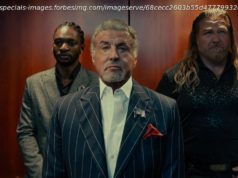I saw “Soft Power” at the Curran theater last week. The play with a musical in the middle is ostensibly about the adventures of a Chinese-American screenwr
I saw “Soft Power” at the Curran theater last week. The play with a musical in the middle is ostensibly about the adventures of a Chinese-American screenwriter in Hollywood as he works with a producer from China to craft a successful TV sitcom set in Shanghai. It is laugh-out-loud funny in many places, and the performances are terrific.
It’s also very political, with much of it taking place during the 2016 Presidential election. The play explores cultural appropriation, how countries perceive one another, and how they present themselves. It discusses how messy democracy can be, compared to the orderly but authoritarian political system in China.
But lest that make it sound boring, let me reiterate: “Soft Power” is very funny. When the Chinese producer lands at the “Hollywood Airport,” for example, everyone he sees is blond and carrying a gun. In another scene, Hillary Clinton hilariously dances for votes on a giant hamburger at a McDonald’s, complete with roller-skating waiters.
The show’s program succinctly defines “soft power” as a “country’s ability to persuade others through the attractiveness of its culture, art, and ideas.” Coined in the late 1980s by political scientist Joseph Nye, soft power stands in contrast to the “hard power” of military and economic strength, which aim to force, not persuade, others to do what you want.
In his 2004 book “Soft Power: The Means to Success in World Politics,” Nye said: “A country may obtain the outcomes it wants in world politics because other countries – admiring its values, emulating its example, aspiring to its level of prosperity and openness – want to follow it.”
Consider what happened during the Cold War when the United States and the Soviet Union vied on the world stage for influence. The Soviets gained support in some third world countries because of their opposition to European imperialism. They had a mighty military. But their hard power couldn’t compete with America’s democratic ideals, economic opportunities and vibrant popular culture.
Earlier this month I watched the documentary “Free to Rock” on KQED that chronicled how rock and roll spread throughout Russia and Eastern Europe despite
Soviet attempts to outlaw it. The documentary makes the case that rock and roll played a large part in the West “winning” the Cold War. That’s soft power in action.
As one reviewer noted, “Perhaps presidential candidates on both sides of the aisle could learn a thing or two from ‘Free to Rock’ about how culture, ideology, and music are some of the most powerful weapons that one can wield.”
And yet, today we have an administration that seems to have no understanding or interest in soft power.
Trump only cares about hard power. He wants to bully other countries into doing his bidding through trade wars and threats of actual war. His insults, his attacks on the press and the courts, and his claims of widespread voter fraud have undermined public faith in democratic institutions. His decision to take babies and young children from their parents at the border – especially since he had no plan and, apparently, no intention to reunite them – have eroded America’s international reputation, perhaps irreparably.
China, on the other hand, has never had much soft power, largely because it is such an authoritarian state. But the Chinese government is investing huge amounts of money in infrastructure projects around the world, increasing its reputation and its soft power.
When Trump pulled the U. S. out of a trade agreement in Asia, he removed important potential limits on Chinese influence in the region.
For years, China has made the argument that America’s democratic ideals are not as desirable as they may seem because they promote instability and chaos. Sadly,
Trump is proving them right. China’s soft power is rising, while America’s is slipping away.
The musical at the Curran plays with the idea of a future where, after Trump’s election, China’s soft power ultimately exceeds America’s and China leads the world.
Still, it ends with a rousing musical number “Democracy” in which the actors reaffirm their support for democracy, flawed though it may be.
“Soft Power” runs through July 8. You’ll laugh a lot. Like America’s soft power, enjoy the play while it’s still here.
Sally Stephens is an animal, park and neighborhood activist who lives in the West of Twin Peaks area.






